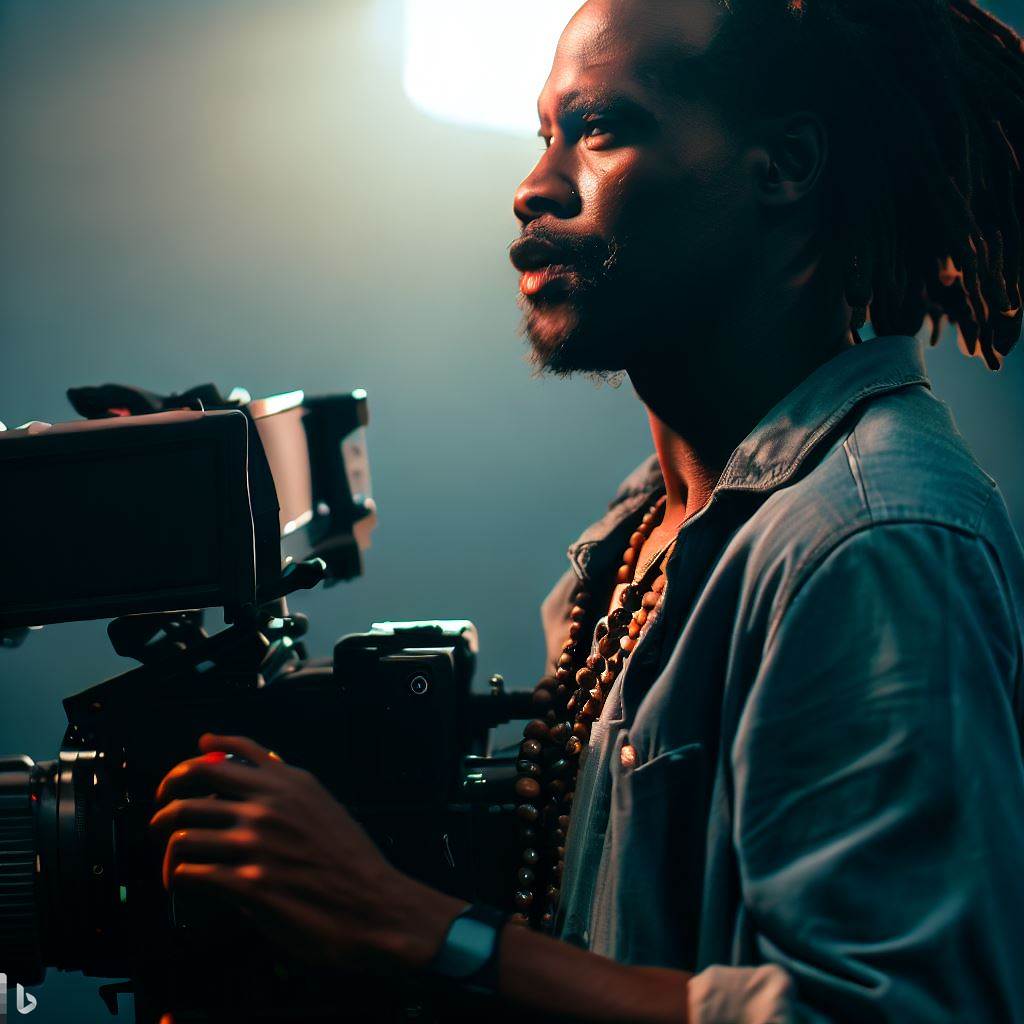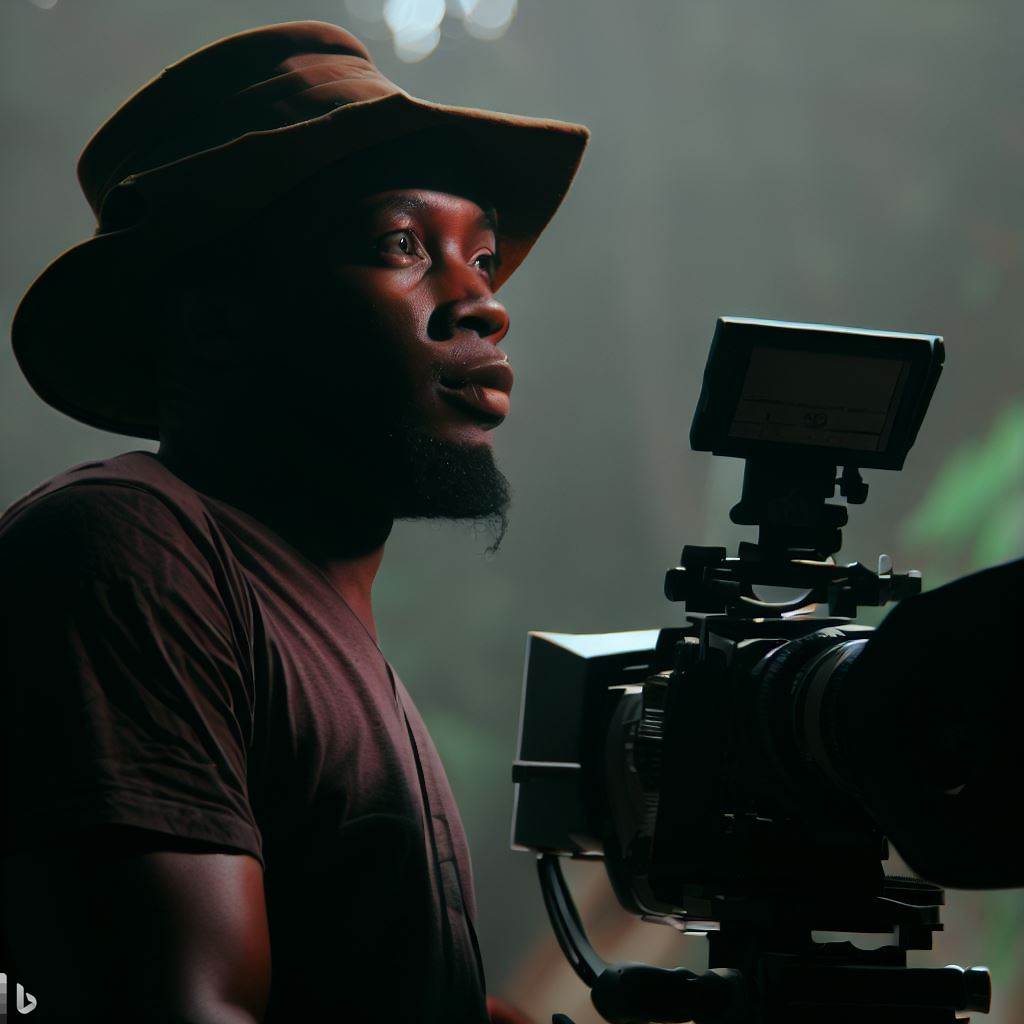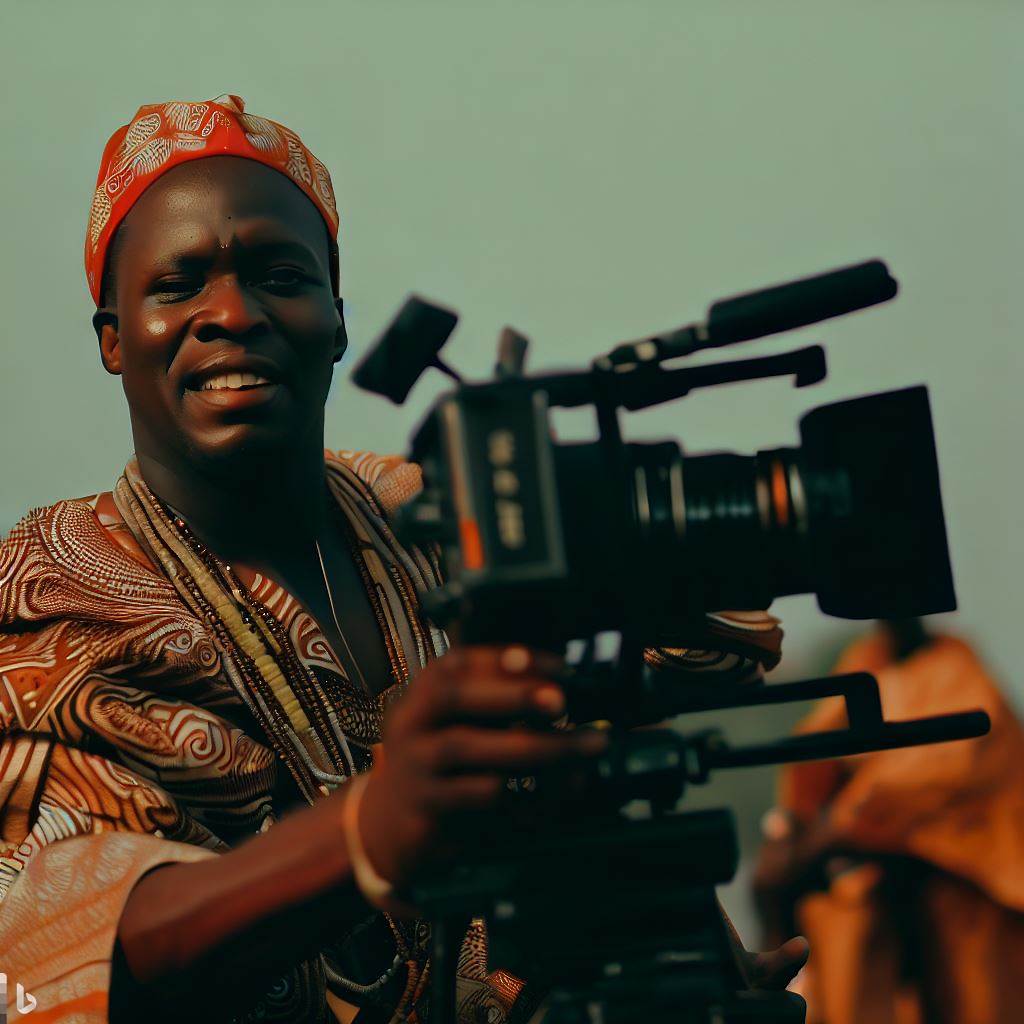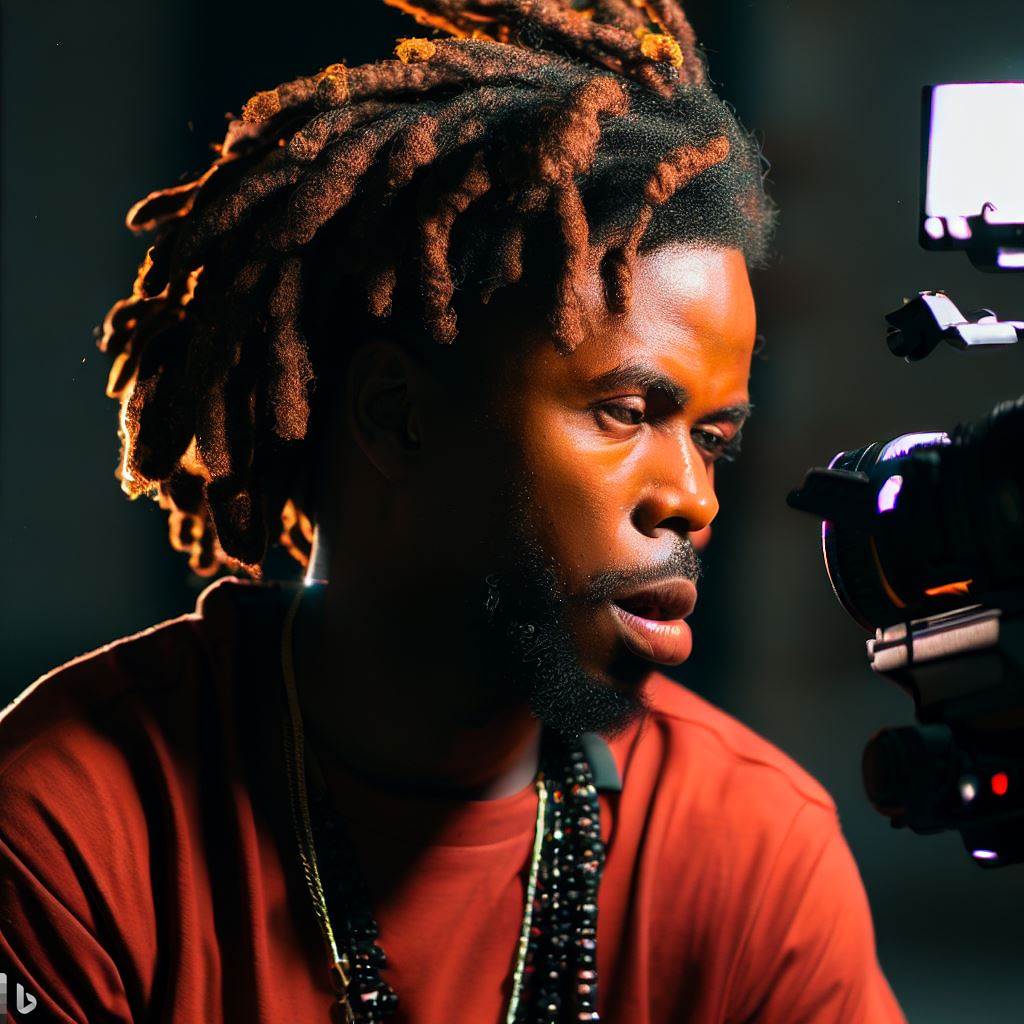Introduction
The portrayal of women in the film industry has often been limited, with few opportunities for women to break into key roles.
However, in Nigeria, a new wave of female cinematographers is shattering glass ceilings and making their mark in the industry.
Highlighting achievements and challenges faced by Nigerian women cinematographers is crucial to recognise their contributions and promote industry gender equality.
This section aims to explore the journey of women cinematographers in Nigeria, from their struggles to their triumphs, and the impact they are making on the film landscape.
By amplifying the voices and work of Nigerian women cinematographers, we challenge gender norms and foster inclusivity in cinema.
Historical Context of Cinematography in Nigeria
When exploring the rise of women cinematographers in Nigeria, it is important to understand the historical context of cinematography in the country.
Overview of the Nigerian Film Industry (Nollywood)
- Nollywood, the Nigerian film industry, has gained significant global recognition in recent years.
- It is considered the second-largest film industry in the world, in terms of output.
- Nollywood has played a pivotal role in shaping the culture, entertainment, and social landscape of Nigeria.
Dominance of male cinematographers in the early years
- During the early years of Nollywood, cinematography was primarily a male-dominated profession.
- Women faced numerous barriers and societal expectations that discouraged their pursuit of cinematography.
- This resulted in a significant gender imbalance within the industry, with only a few women breaking through.
Challenges faced by women in pursuing cinematography
- Women interested in cinematography often had limited access to resources, training, and mentorship.
- Stereotypes and biases within the industry perpetuated the belief that women were not suited for technical roles.
- The lack of representation and support further discouraged women from pursuing cinematography as a career.
Despite these challenges, women in Nigeria have been pushing boundaries and shattering glass ceilings in the world of cinematography.
They have shown immense talent, determination, and resilience in carving out a space for themselves in a male-dominated industry.
With each passing year, more and more women are breaking through barriers and making significant contributions to Nigerian cinema.
These women cinematographers are challenging the status quo, proving that they have both the skill and the vision to excel in their field.
They are changing the narrative by telling diverse and compelling stories through their lens, bringing new perspectives to the screen.
One such trailblazer is Funke Osae-Brown, who has achieved remarkable success as a cinematographer in Nigeria.
She has worked on several critically acclaimed films and has been recognised both nationally and internationally for her craft.
Funke’s journey is an inspiring example for aspiring women cinematographers, showing that it is possible to overcome obstacles and succeed.
Other talented women in the industry, such as Tope Oshin and Kemi Adetiba, have also made significant contributions to Nigerian cinema.
Efforts need to be made to provide equal opportunities, support, and recognition to women in the field.
By fostering an inclusive and empowering environment, the Nigerian film industry can continue to thrive and flourish.
Women cinematographers are reshaping the narrative of Nigerian cinema, creating a more diverse and inclusive industry for all.
Read: Collaboration in Music: The Publisher’s Role in Nigeria
Rise of Women Cinematographers in Nigeria
Profiles of Pioneering Women Cinematographers in Nigeria
- Funmi Dele-Omojowo: With over 25 years of experience, Funmi broke barriers as one of the first female cinematographers in Nigeria. Her work includes award-winning films such as “Tango With Me.”
- Moji Olaiya: Known for her exceptional cinematography skills, Moji made her mark in the industry with movies like “Nkan Adun” and “Agogo Eewo.”
- Kemi Adesoye: As a highly sought-after cinematographer, Kemi has worked on numerous acclaimed films including “October 1” and “The CEO.”
Their contributions to the industry
- Innovative Visual Storytelling: These women cinematographers have brought a fresh perspective to Nigerian cinema through their unique visual storytelling techniques, elevating the overall quality of films.
- Authentic Representation: By capturing important aspects of Nigerian culture and showcasing diverse narratives, these cinematographers have played a significant role in promoting the country’s cultural heritage.
- Technical Excellence: The skills and expertise of these cinematographers have contributed to raising the technical standards of Nigerian films, allowing them to compete on a global scale.
Overcoming societal barriers and breaking stereotypes
- Challenging Gender Norms: Women cinematographers in Nigeria have shattered societal expectations by pursuing careers in a male-dominated industry, proving that talent and passion are not limited by gender.
- Changing Perceptions: These pioneers have shown the world that women can excel in technical roles, challenging the notion that cinematography is solely a man’s domain.
- Mentoring the Next Generation: Through mentorship and support, these women cinematographers have paved the way for aspiring female filmmakers, encouraging them to pursue their dreams and break more glass ceilings.
The rise of women cinematographers in Nigeria has brought about a transformation in the country’s film industry.
Through their remarkable contributions, these pioneering women have shattered glass ceilings, overcome societal barriers, and inspired a new generation of filmmakers.
With their talent, passion, and commitment to excellence, they continue to push boundaries, making Nigeria proud on the global film stage.
Read: Music Publisher: The Unsung Hero of Nigeria’s Music
Impact and Representation of Women Cinematographers in Nigerian Films
In the dynamic world of film-making, women cinematographers in Nigeria have emerged as trailblazers, breaking through glass ceilings and making a significant impact.
How women cinematographers bring a unique perspective to storytelling
Their unique perspective adds a refreshing dimension to storytelling.
- Women cinematographers bring a unique perspective to storytelling by showcasing different angles and viewpoints.
- Through their lens, they capture the essence of characters, emotions, and narratives with depth and sensitivity.
- These talented individuals possess a keen eye for detail and create visually stunning imagery.
- Nigerian films shot by women cinematographers have gained critical acclaim both locally and internationally.
- One such example is the film “Lionheart,” directed by Genevieve Nnaji and shot by Kemi Adetiba.
- The cinematography in “Lionheart” beautifully captures the vibrant Nigerian culture and adds visual richness to the narrative.
Representation of women’s experiences through the lens
Furthermore, the representation of women’s experiences through the lens of women cinematographers is a vital contribution to Nigerian cinema.
- Women cinematographers capture intimacy, vulnerability, and strength in the portrayal of female characters.
- They bring authenticity to women’s stories, ensuring accurate and nuanced depictions.
- Through their work, they challenge societal norms and stereotypes, paving the way for more inclusive narratives.
- For example, in the film “Òlòtūré,” directed by Kenneth Gyang and shot by Adetokunboh Odubawo, the cinematography sheds light on the harrowing experiences of sex trafficking victims.
- Odubawo’s visual storytelling enhances empathy, urging audiences to confront the reality faced by countless women.
- Similarly, in “The Ghost and The House of Truth,” directed by Akin Omotoso and shot by Kabelo Thathe, the cinematography contributes to the exploration of societal issues surrounding violence against women.
- Thathe’s visuals evoke empathy and heighten awareness about these prevalent issues.
- These films, along with many others, underscore the power of women cinematographers in representing women’s stories.
Women cinematographers in Nigeria have had a profound impact on the film industry by bringing their unique perspective to storytelling.
Through their lens, they create visually stunning imagery and capture the essence of characters and narratives.
Moreover, their representation of women’s experiences contributes to breaking societal norms and stereotypes.
Nigerian films shot by women cinematographers have gained critical acclaim, showcasing their immense talent and skill.
As they continue to shatter glass ceilings, these women are paving the way for a more inclusive and diverse cinematic landscape in Nigeria.
Read: Guide to Becoming a Successful Scriptwriter in Nigeria
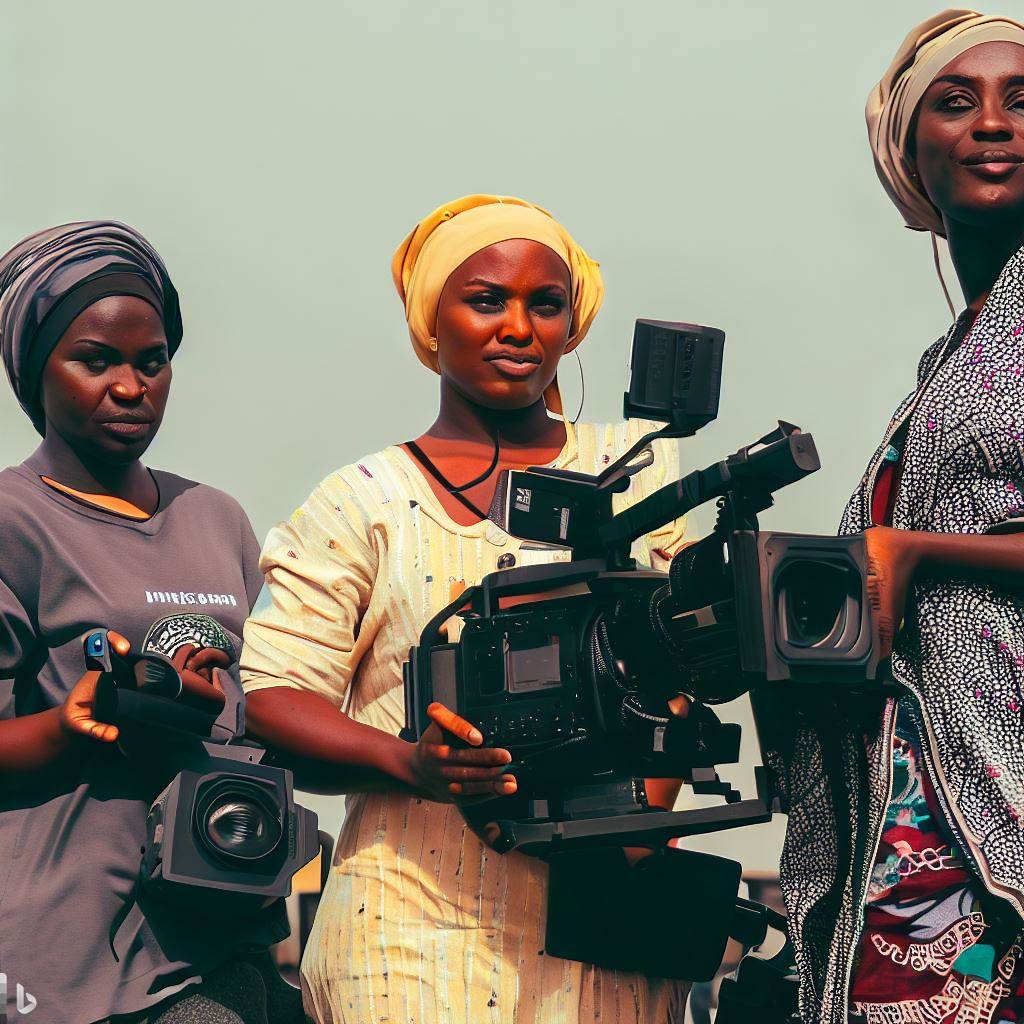
Support and Recognition for Women in Cinematography
In recent years, Nigeria has witnessed a significant increase in initiatives and organisations aimed at promoting and supporting women cinematographers.
These efforts play a crucial role in shattering the glass ceilings that have hindered their progression in the industry.
Analysis of initiatives and organizations promoting women cinematographers in Nigeria
- Women in Film Nigeria (WIFNG): This organisation actively encourages and supports women in all aspects of the film industry, including cinematography.
- The Female Crew: A platform that promotes equality and empowers women behind the camera, helping them find opportunities and recognition.
- The Nigerian Women in Cinematography Collective: An initiative that fosters collaboration, mentorship, and networking among female cinematographers.
These initiatives provide much-needed resources, training, and support to women in cinematography, creating a more inclusive and diverse industry.
Role of international film festivals in showcasing their work
International film festivals have also played a pivotal role in showcasing the work of women cinematographers in Nigeria.
These festivals provide a platform for recognition, exposure, and networking opportunities.
- The Africa International Film Festival (AFRIFF): This annual festival often screens films shot by talented Nigerian women cinematographers, gaining international recognition for their work.
- The Lagos International Film Festival: Another prominent festival that serves as a gateway to global recognition for women cinematographers in Nigeria.
These festivals serve as a catalyst for establishing connections with industry professionals and creating a pathway for further success.
Importance of mentorship and networking opportunities
Mentorship and networking opportunities play a vital role in supporting women cinematographers in Nigeria.
By connecting with experienced industry professionals, aspiring cinematographers can gain valuable knowledge, guidance, and exposure to job opportunities.
Cinematography mentorship programs, such as those offered by WIFNG and The Female Crew, help bridge the gap between aspiring and established women cinematographers.
They provide a safe space to learn, grow, and connect with mentors who have firsthand industry experience.
These initiatives and organizations organize networking events, workshops, and conferences to create a community where women cinematographers exchange ideas and collaborate.
The support and recognition for women in cinematography in Nigeria have seen significant progress thanks to initiatives, organizations, and international film festivals.
These platforms provide the necessary resources, exposure, and mentorship opportunities for women to break through the glass ceilings in the industry.
With continued efforts and a growing network, the future looks promising for women cinematographers in Nigeria.
Read: Music Publishing Contracts in Nigeria: A Deep Dive
Explore Further: Nigeria’s Makeup Artists and the Use of Social Media for Growth
Challenges and Future Outlook
Despite the progress made by women cinematographers in Nigeria, there are still significant challenges that need to be addressed to ensure gender equality in the industry.
Examination of the Challenges Still faced by Women Cinematographers in Nigeria
1. Gender Bias
- Many women cinematographers in Nigeria still face gender bias and stereotypes, which limit their opportunities for growth and recognition.
- Male-dominated crews and production teams often overlook the talent and skills of women cinematographers, undermining their professional abilities.
- Acknowledging and challenging these biases is crucial to creating an inclusive and diverse film industry in Nigeria.
2. Limited Support
- Women cinematographers often struggle with limited resources and financial support for their projects compared to their male counterparts.
- The lack of funding opportunities and mentorship programs specifically designed for women filmmakers restricts their ability to develop their craft.
- Expanding support networks and creating funding initiatives exclusively for women cinematographers will help bridge this gap.
3. Stereotypes and Prejudices
- Traditional gender roles and societal expectations can undermine the credibility and authority of women cinematographers.
- The assumption that women are more suited to certain genres or roles limits their creative freedom and potential for growth.
- Challenging these stereotypes and promoting diverse perspectives within the industry are necessary steps for progress.
4. Lack of Representation
- The underrepresentation of women cinematographers in Nigeria affects the visibility and recognition of their work.
- With fewer role models and mentors, it becomes challenging for aspiring women cinematographers to envision a successful career in the industry.
- Increasing visibility and providing platforms that showcase the work of women cinematographers will inspire and motivate the next generation.
Steps Towards Gender Equality
- Implementing and enforcing policies that promote gender equality and diversity in the film industry.
- Creating mentorship programs and supportive networks for women cinematographers to foster their professional growth.
- Including more women in decision-making positions, such as production companies and film festivals, to challenge the traditional power dynamics.
Potential Growth and Future Outlook
- The future looks promising for women cinematographers in Nigeria as the industry continues to evolve.
- Increased awareness and efforts to bridge the gender gap will create a more inclusive and balanced film landscape.
- With the advent of digital platforms and independent film-making, women cinematographers have more opportunities to showcase their talent and tell their stories.
- As more women break into the industry and gain recognition, the narrative surrounding gender in Nigerian cinema will transform.
While challenges persist, the future outlook for women cinematographers in Nigeria is promising.
Addressing gender biases, providing support, challenging stereotypes, and increasing representation can help women shatter limiting glass ceilings in the industry.
Conclusion
This section has highlighted the significant contributions made by women cinematographers in Nigeria.
We have discussed the challenges they face and the strides they have made in shattering glass ceilings.
It is crucial to emphasise the importance of encouraging and supporting women cinematographers in Nigeria.
By providing equal opportunities, training, and resources, we can further enhance their skills and advance the industry as a whole.
Women cinematographers have the potential to make a profound impact on the industry, bringing fresh perspectives and narratives.
By shattering glass ceilings, they open doors for aspiring female cinematographers and pave the way for a more diverse and inclusive film industry.
As the barriers continue to be broken, we have the opportunity to witness a transformation in the field.
It is our responsibility to champion and uplift the voices of women cinematographers, ensuring that their talent and creativity flourish.
By fostering an environment that supports and recognises women cinematographers, we can cultivate a vibrant and thriving film industry in Nigeria.
The potential impact of women shattering glass ceilings is immeasurable, and the industry stands to benefit from their unique contributions.
Let us continue to celebrate and amplify the achievements of women cinematographers in Nigeria, aspiring to create an industry that embraces diversity, equality, and excellence.

